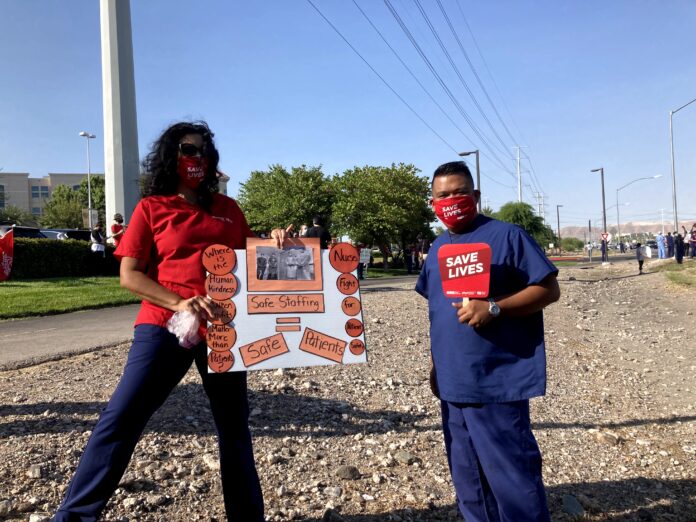Almost a year ago, Gov. Sisolak pushed for more volunteers to enter into an already existing program called NAP (Nursing Assistance Program) in order to help combat the nursing shortage affecting Las Vegas.
While students are expected to fulfill 800 hours of clinical hours in order to obtain their nursing degree and work in the field, NAP provides another avenue where students can work on the job while getting their hours.
“The first time we stepped onto a clinical floor we wanted to cry. We felt like a burden asking questions when these nurses have too many patients,” said UNLV senior Katherine Dimaya. “This isn’t a matter of a shortage of nurses, it’s a resource shortage.”
The staffing shortage has been ongoing for years due to the COVID-19 pandemic. Many nursing students have shouldered part of the load off an industry with a high turnover rate. The average turnover for hospitals is about 90% of its workforce and 83% of the turnovers is from registered nursing staff, since 2016 according to a report by the NSI.
More so than ever, nurses in the field are experiencing a high level of burnout, a state of mental, physical, and emotional exhaustion caused by sustained work-related stressors. These stressors can range from long hours, the pressure of quick decision-making, and the strain of caring for patients who weren’t able to leave the hospital with their life.
Many nursing students are in fear as they witness firsthand the effects of all the compounding problems in the industry.
Obtaining critical clinical hours, where they train first hand under licensed professionals and obtain real world knowledge, puts even further strain on the workforce, causing students to worry about their education.
Dean of Nursing, Angela Amar agreed with Dimaya, “We’ve had to cut down on clinical hours due to many factors, one of them being the inability for hospitals to provide PPE to our students. We’ve had to provide our own [PPE] in order for nursing students to continue to get important workplace experience, as well as rely on our clinical simulator to allow our students to get all the help they can get.”
The Build Back Better plan has provisions to support the health care workforce by providing critical funding to hospitals, as well as funding to the shortage of teachers and professors able to educate the future of the workforce. But nursing students don’t see the light at the end of the tunnel.
“We see what is coming ahead and it scares us,” Dimaya said. “Mental health for nurses in school are taken for granted. We feel disposable. As a nursing student, it’s hard knowing that’s the reality of what we’re getting into.”
“Shortages have been around since forever. Until hospitals give us safe ratios, the problems of the system will continue and burnout and nurse shortage will continue.”
UNLV has CAPS, (Student Counseling and Psychological Services) available to all students and self-care is instilled in the nursing curriculum, but Dean Amar agrees that it’s, “A band-aid for the systemic problems of the healthcare industry” and that “ we can only do so much to prepare our students for the difficult workload ahead of them. The system has to be fundamentally fixed to truly combat the shortages nationwide.”
What can fellow students do to help?
Dimaya asks students to, “advocate on a governmental level, for more resources. To protect people in hospitals and their nurses. Safe nurse to patient ratios, state and federal mandated ratios is the answer. We just want to keep our patients safe.”
CAPS offers crisis services for students who may be experiencing urgent concerns. Students can call (702) 895-3627 or walk into CAPS for crisis services during business hours, and meet with a crisis counselor.

